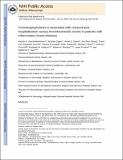Thromboprophylaxis Is Associated With Reduced Post-hospitalization Venous Thromboembolic Events in Patients With Inflammatory Bowel Diseases
Author(s)
Ananthakrishnan, Ashwin N.; Cagan, Andrew; Gainer, Vivian S.; Cheng, Su-Chun; Cai, Tianxi; Scoville, Elizabeth; Konijeti, Gauree G.; Szolovits, Peter; Shaw, Stanley Y.; Churchill, Susanne; Karlson, Elizabeth W.; Murphy, Shawn N.; Kohane, Isaac; Liao, Katherine P.; ... Show more Show less
DownloadSzolovits_Thromboprophylaxis.pdf (279.4Kb)
PUBLISHER_CC
Publisher with Creative Commons License
Creative Commons Attribution
Terms of use
Metadata
Show full item recordAbstract
Background & Aims
Patients with inflammatory bowel diseases (IBDs) have increased risk for venous thromboembolism (VTE); those who require hospitalization have particularly high risk. Few hospitalized patients with IBD receive thromboprophylaxis. We analyzed the frequency of VTE after IBD-related hospitalization, risk factors for post-hospitalization VTE, and the efficacy of prophylaxis in preventing post-hospitalization VTE.
Methods
In a retrospective study, we analyzed data from a multi-institutional cohort of patients with Crohn's disease or ulcerative colitis and at least 1 IBD-related hospitalization. Our primary outcome was a VTE event. All patients contributed person-time from the date of the index hospitalization to development of VTE, subsequent hospitalization, or end of follow-up. Our main predictor variable was pharmacologic thromboprophylaxis. Cox proportional hazard models adjusting for potential confounders were used to estimate hazard ratios (HRs) and 95% confidence intervals (CIs).
Results
From a cohort of 2788 patients with at least 1 IBD-related hospitalization, 62 patients developed VTE after discharge (2%). Incidences of VTE at 30, 60, 90, and 180 days after the index hospitalization were 3.7/1000, 4.1/1000, 5.4/1000, and 9.4/1000 person-days, respectively. Pharmacologic thromboprophylaxis during the index hospital stay was associated with a significantly lower risk of post-hospitalization VTE (HR, 0.46; 95% CI, 0.22–0.97). Increased numbers of comorbidities (HR, 1.30; 95% CI, 1.16–1.47) and need for corticosteroids before hospitalization (HR, 1.71; 95% CI, 1.02–2.87) were also independently associated with risk of VTE. Length of hospitalization or surgery during index hospitalization was not associated with post-hospitalization VTE.
Conclusions
Pharmacologic thromboprophylaxis during IBD-related hospitalization is associated with reduced risk of post-hospitalization VTE.
Date issued
2014-03Department
Massachusetts Institute of Technology. Department of Electrical Engineering and Computer ScienceJournal
Clinical Gastroenterology and Hepatology
Publisher
Elsevier
Citation
Ananthakrishnan, Ashwin N., Andrew Cagan, Vivian S. Gainer, Su-Chun Cheng, Tianxi Cai, Elizabeth Scoville, Gauree G. Konijeti, et al. “Thromboprophylaxis Is Associated With Reduced Post-Hospitalization Venous Thromboembolic Events in Patients With Inflammatory Bowel Diseases.” Clinical Gastroenterology and Hepatology 12, no. 11 (November 2014): 1905–1910.
Version: Author's final manuscript
ISSN
15423565